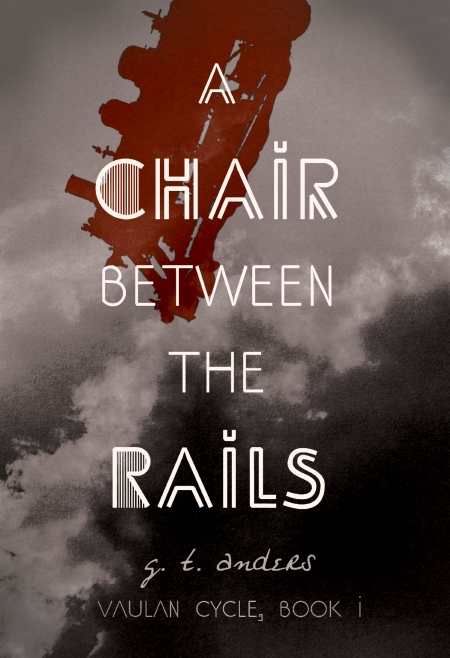A Chair Between the Rails
Human emotion becomes spiritual experience in this poetic supernatural novel of a broken family and psychic ability.
A Chair Between the Rails, by G. T. Anders, is an experience both original and redolent of its roots in the works of Madeleine L’Engle and William Blake. Simultaneously lyrical and intuitive, it follows writer James Feckidee as he discovers that his supernaturally gifted son may be the key to saving the world.
Having lost his beloved uncle and driven away his wife, James finds himself unable to articulate his desire to be affirmed as a good person. As he relives interactions with his wife and uncle, he inevitably realizes that he is selfish, childish, probably an alcoholic, and generally a lousy family man. But when a terrifying otherworldly beast attacks James in his home, he and his son, Austin, seek safety with his friend Matt Gaddo and Matt’s intuitive sister, Sadie. When Austin’s ability to psychically locate Vaulan, an ancient god, manifests suddenly, the fugitives join forces with ancient beings, Proton and Ihrel, in an effort to find Vaulan and bring him back to Earth.
Anders writes boldly and bravely, allowing his flawed narrator to experience all the selfishness and anger of an unjustly sidelined second banana. Outshone by his brilliant son and stubbornly ignorant of the meaning of the group’s mission, James struggles to locate himself within the narrative’s supernatural A-Team. His self-doubt and shame mirror the situation in which he finds himself with his family, and, in fact, the book can easily be read as a metaphor for James’s recovery from his divorce. Though Austin seems to be the star of the show, James eventually overcomes his resentment toward his son and sacrifices his own ego for the greater good.
Fans of spiritual science fiction will hail Anders as an exciting new voice. Though it is broadly spiritual, this book’s emphasis is primarily on the power of the written word rather than on any single religious tradition. The lyrical writing style is reminiscent of both William Blake and Ray Bradbury in its heavy use of metaphor and association. In a typical example, instead of simply “waking up,” a character “[comes] out of a dream of shards.”
Anders’s gift is in his use of lyrical prose to describe concrete experiences. A critical crux of the story is the characters’ boarding of a locomotive-like space ship. The only way to do this is to jump in front of the train, committing suicide. The language leading up to the impact peaks in its poetic overtones, but also ably describes the physical motion of the ship and its destructive effects on its surroundings, as well as the positions and emotions of the people waiting for it. The result is a deep and well-rounded description that, though clearly a metaphor for self-sacrifice, seems very solid within its context.
A Chair Between the Rails is a satisfying read. Though sometimes as abstract as C. S. Lewis’s Space Trilogy, the book grounds itself in human experiences as visceral as heartbreak, expressing the follies of the main characters so skillfully that it is nearly impossible not to feel along with them. By poetically portraying human emotional experiences as part of finding a god, Anders ties both feeling and art to a fresh and interesting concept of deity.
Anders’s strong voice is a powerful indicator of his future as a writer. This work, the first in the three-part Vaulan Cycle, is not to be missed. This author is one to watch.
Reviewed by
Anna Call
Disclosure: This article is not an endorsement, but a review. The publisher of this book provided free copies of the book and paid a small fee to have their book reviewed by a professional reviewer. Foreword Reviews and Clarion Reviews make no guarantee that the publisher will receive a positive review. Foreword Magazine, Inc. is disclosing this in accordance with the Federal Trade Commission’s 16 CFR, Part 255.

